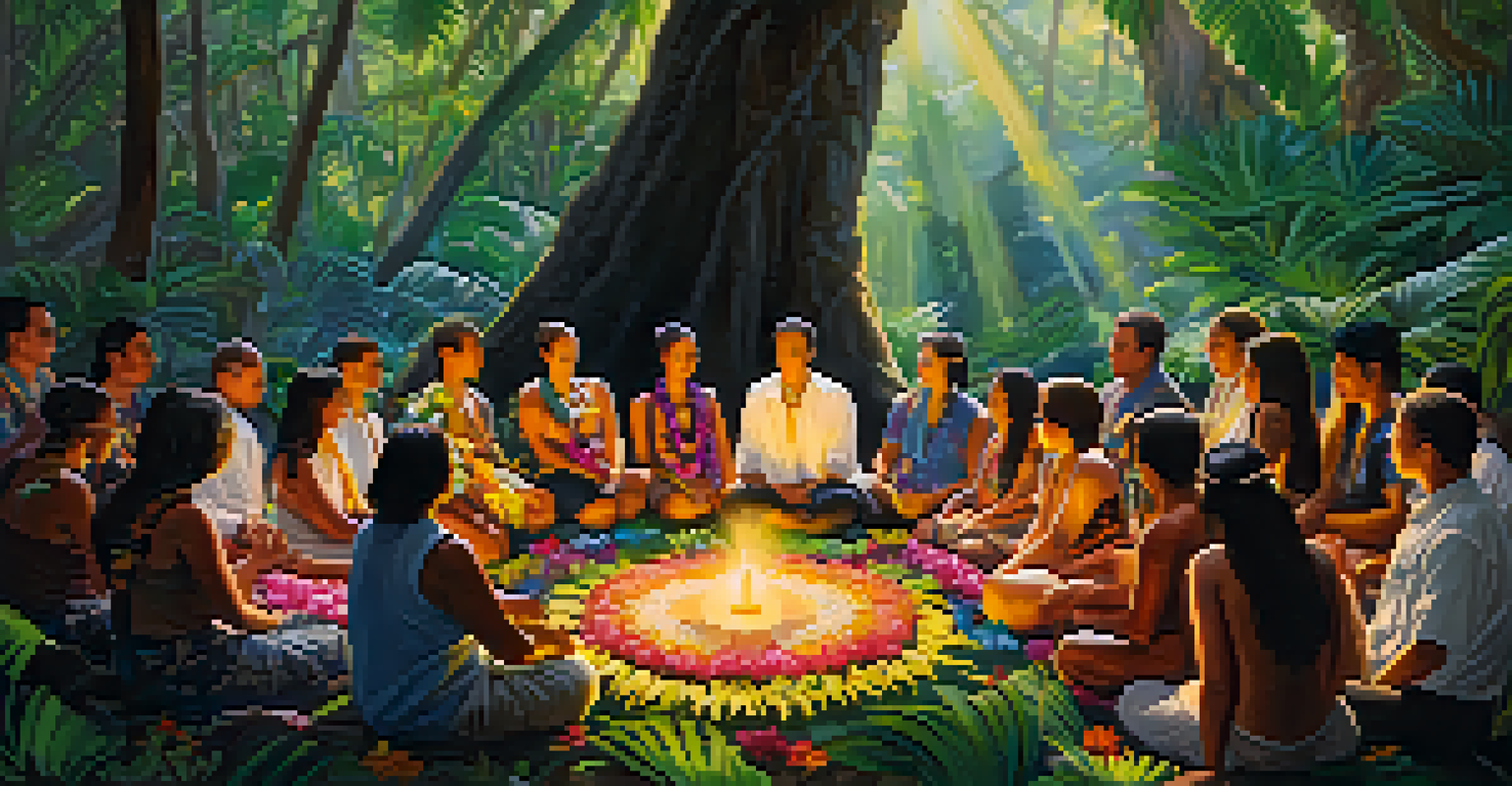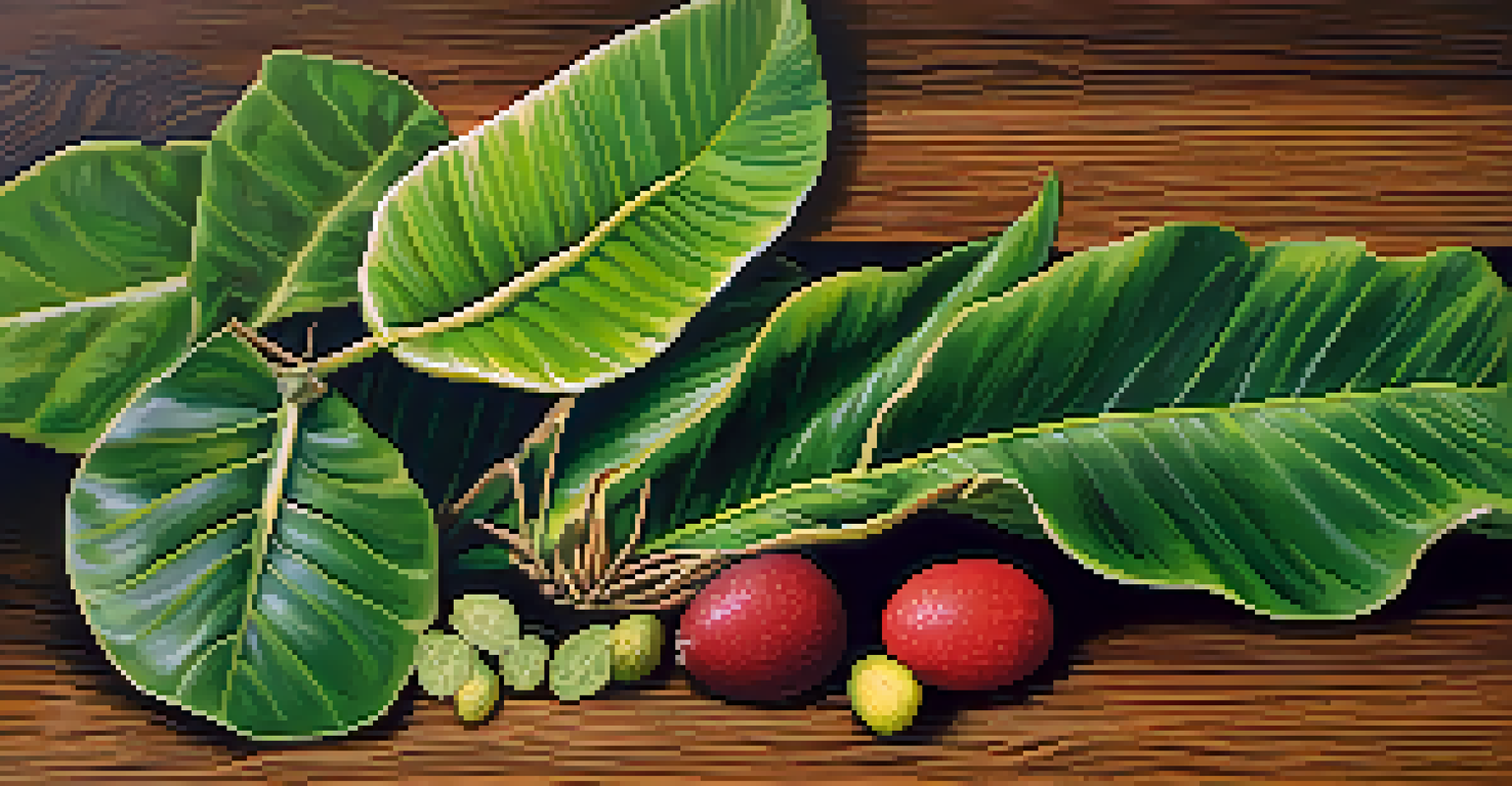The Importance of Traditional Hawaiian Healing Practices

Understanding Traditional Hawaiian Healing Practices
Traditional Hawaiian healing, often referred to as 'laau lapaau', encompasses a rich array of practices, including herbal remedies, massage, and spiritual rituals. This holistic approach emphasizes the balance between body, mind, and spirit, reflecting the interconnectedness of all elements in life. It draws heavily on the wisdom passed down through generations, integrating knowledge of the natural world with cultural values.
The greatest medicine of all is to teach people how not to need it.
At the heart of these practices is the belief that health is a state of harmony. When one aspect of a person's life is out of balance, it can lead to physical or emotional ailments. This perspective encourages individuals to seek not just treatment for symptoms but to address the underlying causes of their dis-ease, fostering a deeper understanding of their own well-being.
In today's fast-paced world, many are rediscovering these ancient practices, recognizing their potential to complement modern medicine. As a result, traditional Hawaiian healing has gained popularity, not just in Hawaii, but globally, as people seek more holistic and natural approaches to health.
The Role of Nature in Hawaiian Healing
Hawaiian healing practices are deeply rooted in the natural environment. The islands' unique flora and fauna provide an abundance of plant-based medicines that have been utilized for centuries. For example, the use of 'noni' fruit for its health benefits showcases how local resources are harnessed to promote wellness.

Practitioners often emphasize the importance of connecting with nature, as it's believed that this connection contributes to healing. Spending time outdoors, whether in the lush forests or by the ocean, can have a rejuvenating effect. This relationship with the land is not just about physical healing; it also nurtures spiritual and emotional well-being.
Holistic Approach to Healing
Traditional Hawaiian healing emphasizes the interconnectedness of body, mind, and spirit, encouraging individuals to address the root causes of their dis-ease.
As modern society becomes increasingly disconnected from nature, the teachings of traditional Hawaiian healing remind us of the importance of this bond. Integrating nature into our healing practices can lead to more profound and lasting health benefits.
The Spiritual Aspect of Hawaiian Healing
Spirituality is a cornerstone of traditional Hawaiian healing. Many practices involve invoking the spiritual realm, honoring ancestors, and connecting with 'mana', or spiritual energy. This belief system emphasizes that healing is not just a physical process, but also involves nurturing the spirit and emotions.
Nature itself is the best physician.
Rituals, prayers, and chants are often incorporated into healing sessions, creating a sacred space where healing can occur. This aspect of Hawaiian healing encourages individuals to reflect on their life journey, acknowledge their struggles, and seek guidance from higher powers. It fosters a sense of community and belonging, as individuals come together to support one another.
Incorporating spirituality into healing can enhance the overall effectiveness of treatments. By addressing the spiritual dimension, individuals may find a more profound sense of peace and empowerment, ultimately leading to a more comprehensive approach to health.
Herbal Remedies: Nature's Pharmacy
Herbal remedies form a significant part of traditional Hawaiian healing. Practitioners often utilize a variety of plants, each with unique healing properties. For instance, the leaves of 'awa (kava) are known for their calming effects, while the roots of 'olena (turmeric) are celebrated for their anti-inflammatory benefits.
The process of creating these remedies is steeped in tradition, often involving careful preparation and a deep understanding of each plant's properties. This knowledge has been preserved through oral traditions and hands-on learning, highlighting the importance of community in maintaining these practices.
Nature's Role in Wellness
The use of local flora and fauna in herbal remedies highlights the importance of connecting with nature for physical, spiritual, and emotional healing.
As people increasingly seek natural alternatives to pharmaceuticals, these herbal remedies offer a viable option. They remind us of the importance of respecting and utilizing our natural resources in a responsible way.
The Importance of Community in Healing
Community plays a vital role in traditional Hawaiian healing practices. The concept of 'ohana, or family, extends beyond biological ties to encompass friends and neighbors, creating a supportive network for individuals seeking healing. This collective approach fosters a sense of belonging and shared responsibility for one another's well-being.
Healing ceremonies often involve the community, where everyone participates in rituals that honor the individual needing support. This not only amplifies the healing energy but also reinforces social bonds and strengthens cultural identity. It's a beautiful reminder that healing is often a communal journey, rather than a solitary one.
In today's individualistic society, revisiting the communal aspects of healing can provide valuable lessons. By engaging with our communities, we can create a more supportive environment that nurtures mental, emotional, and physical health.
Connecting Traditional Practices with Modern Wellness
As the wellness industry evolves, there is a growing interest in integrating traditional Hawaiian healing practices into modern health approaches. This fusion recognizes the value of ancient wisdom while also addressing contemporary health challenges. Practices like mindfulness, meditation, and yoga, which share principles with Hawaiian healing, are becoming increasingly popular.
Health practitioners are beginning to understand that combining traditional methods with modern medical practices can lead to more comprehensive treatment plans. This holistic approach can enhance patient care, offering a wider range of healing modalities for individuals to explore.
Community-Centric Healing Practices
The concept of 'ohana' fosters a supportive community network that enhances healing through collective participation in rituals and ceremonies.
By embracing both traditional and modern practices, we can create a more inclusive understanding of health and wellness. This not only empowers individuals to take charge of their well-being but also honors the cultural heritage that has shaped these practices.
Preserving Traditional Hawaiian Healing for Future Generations
As interest in traditional Hawaiian healing grows, so does the need for preservation and education. Many practitioners are dedicated to passing down their knowledge to younger generations, ensuring that these valuable practices are not lost. Workshops, classes, and community events are increasingly being organized to share this wisdom.
However, challenges remain, such as the commercialization of these practices, which can dilute their authenticity. It's essential to approach traditional healing with respect and a genuine desire to learn, rather than simply seeking a quick fix. By understanding the cultural significance behind these practices, we can honor their roots.

Preserving traditional Hawaiian healing is about more than just maintaining techniques; it's about fostering a deeper connection to culture and identity. This commitment ensures that these practices will continue to benefit individuals and communities for generations to come.